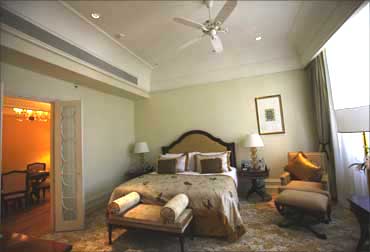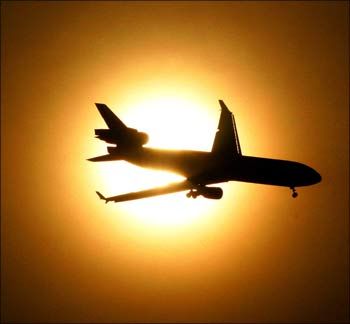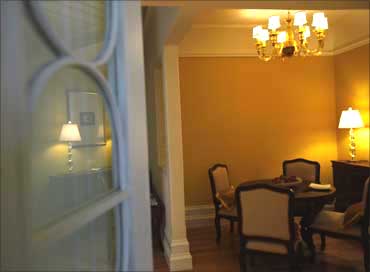 | « Back to article | Print this article |
Air travel, hotel stays will now be costlier!
Air travel and hotel stays will be expensive as the government raised service tax air travel in economy class by up to Rs 250 and brought hotel accommodation, among others, under the tax net in the Budget unveiled on Monday.
The measures would result in a net revenue gain of Rs 4,000 crore (Rs 40 billion).
The government, however, retained the rate of service tax at 10 per cent.
Finance Minister Pranab Mukherjee today proposed raising the service tax on air travel by Rs 50 to Rs 150 in the case of domestic air travel and by Rs 250 to Rs 750 on overseas journeys by economy class.
Click NEXT to read on . . .
Air travel, hotel stays will now be costlier!
The service tax on travel by higher classes on domestic sector would be at 10 per cent to bring it on par with journeys by higher classes on international air travel, he said.
The Budget proposes to include sectors like hotel accommodation with a room tariff of over Rs 1,000 per day and air-conditioned restaurants serving liquor under service tax ambit.
"My proposals relating to service tax are estimated to result in net revenue gain of Rs 4,000 crore for the year," Mukherjee said.
"It will mostly affect the airline and hotel sector. They may go for rate hike. But I think the fallout will be short-term and the sectors will not face any serious problems," KPMG executive director Vikas Vasal said.
Click NEXT to read on . . .
Air travel, hotel stays will now be costlier!
Other experts also expressed similar views. "The hotel and airline sectors are areas generating larger revenues and the majority of the intended Rs 4,000 crore would come from it," an expert of Deloitte said.
The finance minister also said the actual collections of service tax do not reflect the full potential of this sector.
"I seek to achieve a closer fit between the present service tax regime and its GST (Goods and Services Tax) successor by bringing in a few new services into the tax net to expand the tax base while ensuring that the impact is predominantly on sections of society that have the ability to pay," he said.
The proposed Goods and Services Tax will subsume the plethora of indirect taxes.
Click NEXT to read on . . .
Air travel, hotel stays will now be costlier!
"It is a step in the right direction and will help when we introduce the GST," Vasal said.
Among other measures, Mukherjee proposed to replace the service tax on health check-ups, announced in last year's Budget, with a tax on all services provided by hospitals with 25 or more beds and having central air-conditioning, with an abatement of 5 per cent.
"I also propose to extend the levy to diagnostic tests of all kinds with the same rate of abatement. However, all government hospitals shall be outside this levy," Mukherjee said.
Services provided by life insurance companies in the area of investment are also proposed to be brought into tax net on the same lines as ULIPs, he added.
Click NEXT to read on . . .
Air travel, hotel stays will now be costlier!
"The government has tried to put only high-end hospitals and treatment facilities under the ambit of the service tax and assure the common man that he would not be affected. This is only for those who are already paying, say, Rs 5 lakh (Rs 500,000), for treatment," Vasal said.
The government also proposed expanding the scope of legal services to include services provided by business entities to individuals as well as representational and arbitration services by individuals to business entities.
Mukherjee also proposed to exempt all individual and sole proprietor taxpayers with a turnover of up to Rs 60 lakh (Rs 6 million) from the formalities of audit.
"The number of assessees in service tax has grown manifold ... a large number of them comprise individuals or sole proprietors with small turnovers. Any audit at their premises tends to dislocate their activities for the duration of the audit," he said, adding that all assessees with turnover up to Rs 60 lakh would be provided benefit of three percentage points in interest on delayed payment.
Click NEXT to read on . . .
Air travel, hotel stays will now be costlier!
Mukherjee also said the government will adopt of 'Point of Taxation' rules for services.
"This will mean that now service providers have to keep proper records and adopt accrual system of accounting rather than the existing cash basis," said the expert from Deloitte.
Under cash basis of accounting, previous year's dues are not carried forward and are considered bad debt, while under accrual basis such carry forwards are valid.






